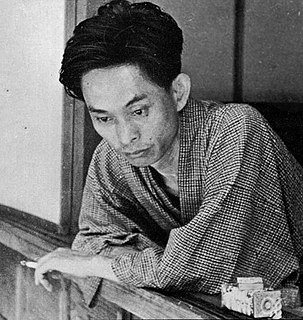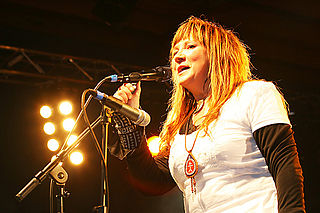A Quote by Samantha Hunt
One night as I girl I spied my grandma and one of her sisters outside, holding hands and singing, "Sprites of the night are we, are we. Singing and dancing joyfully." It was witchy and wonderful because it meant there was power in joy. They were not afraid of the night because they were giggling. I am very interested in finding the surprising boundaries, for instance, where do joy and fear meet?
Related Quotes
There were once two sisters who were not afriad of the dark because the dark was full of the other's voice across the room, because even when the night was thick and starless they walked home together from the river seeing who could last the longest without turning on her flashlight, not afraid because sometimes in the pitch of night they'd lie on their backs in the middle of the path and look up until the stars came back and when they did, they'd reach their arms up to touch them and did.
I have often sung to drown my sorrow, but seldom to express my happiness. Crying for joy, and singing for joy, were alike uncommon to me while in the jaws of slavery. The singing of a man cast away upon a desolate island might be as appropriately considered as evidence of contentment and happiness, as the singing of a slave; the songs of the one and of the other are prompted by the same emotion.
It is so easy to be hopeful in the daytime when you can see the things you wish on. But it was night, it stayed night. Night was striding across nothingness with the whole round world in his hands . . . They sat in company with the others in other shanties, their eyes straining against cruel walls and their souls asking if He meant to measure their puny might against His. They seemed to be staring at the dark, but their eyes were watching God.
I always wanted to sing, I always loved to sing. As a child I was singing all the time, and my parents were singing all the time, but not the traditional songs because they were very Christian; the Christian Sámis learnt from the missionaries and the priests that the traditional songs were from the Devil, so they didn't teach them to their children, but they were singing the Christian hymns all the time. So I think I got my musical education in this way. And of course the traditional songs were always under the hymns, because it doesn't just disappear, the traditional way of singing.
All of Japan once a year will get up on their rooftops, because that's the night that the shepherd boy from one side of the Milky Way gets to meet the weaver girl on the other side of the Milky Way. They all get up on their roofs and watch that night. So they long for 365 days and then on the 365th night, they see the result of that longing.







































